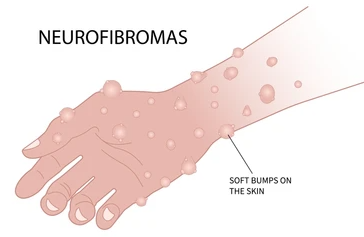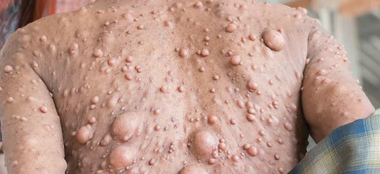Neurofibromatosis is more than just a medical condition—it’s a lifelong journey that affects not only physical health but also emotional and social well-being.
In this blog, we will guide you through what Neurofibromatosis is, how it develops, the challenges patients face, and how we can help.
- What is Neurofibromatosis?
Neurofibromatosis (NF) is a genetic disorder that causes tumors to form on nerve tissue. These tumors, known as neurofibromas, are typically non-cancerous but can grow anywhere in the body, including the skin, brain, and spinal cord. There are three types:
- NF1 (Type 1) – the most common type, usually appearing in childhood.
- NF2 (Type 2) – less common, affects the nervous system more significantly.
- Schwannomatosis – a rare form, often causing chronic pain due to pressure on nerves .

- How Does It Develop?
Neurofibromatosis is usually inherited, meaning it’s passed down from a parent. However, in about 30–50% of cases, it can occur due to a spontaneous genetic mutation.
The condition results from changes in genes responsible for regulating cell growth. When these genes malfunction, tumors form along nerves. In NF1, small benign lumps develop on or under the skin, while NF2 and Schwannomatosis often lead to tumors inside the body, particularly on nerves.
- What Issues Do People Face Due to Neurofibromatosis?
Living with NF can present numerous challenges:
- Visible lumps and skin growths causing cosmetic concerns.
- Pain or discomfort from nerve involvement.
- Learning disabilities (in children with NF1).
- Hearing or vision problems (especially in NF2).
- Difficulty with mobility if spinal or limb nerves are affected.
- Increased risk of certain cancers (in rare cases).
4. Personal, Social, Hygienic, and Other Problems
The impact of Neurofibromatosis extends beyond physical symptoms:
Personal Challenges:
- Self-esteem issues due to appearance.
- Anxiety and depression, especially when tumors are prominent or painful.
- Chronic discomfort impacting day-to-day life.
Social Impact:
- Social withdrawal due to fear of being judged.
- Bullying or discrimination, particularly in school-aged children.
- Reduced participation in work or group activities.
Hygienic Concerns:
- Tumors in areas prone to sweating can lead to skin irritation, infections, and odour.
- Difficulty maintaining cleanliness if growths occur in sensitive or hard-to-reach areas.
Other Issues:
- Trouble wearing clothes or accessories due to lump location.
- Difficulty finding suitable treatment or understanding long-term care needs.
- Treatment Options at MACS Clinic
Surgical Treatment
At MACS Clinic, surgical treatment is the cornerstone of managing symptomatic or cosmetically concerning neurofibromas. Each patient is unique, and Mr. Vadodaria uses personalised approach to surgical planning, execution, and follow-up care.
When is Surgery Recommended?
Surgical removal is considered when:
- Neurofibromas are painful, growing rapidly, or affecting nerve function.
- There is significant cosmetic disfigurement affecting self-esteem.
- The tumors interfere with clothing, movement, or hygiene.
- There is a risk of malignancy or transformation into plexiform neurofibroma.
- The patient desires removal for personal or psychological comfort.
Preoperative Evaluation
Before surgery, patients undergo a comprehensive assessment by Mr. Shailesh Vadodaria that includes:
- Clinical examination to evaluate the number, size, and depth of neurofibromas.
- Involvement of other specialists if required
- Imaging (Ultrasound, MRI or CT) if deeper structures or nerves are involved.
- Blood work to ensure suitability for anesthesia and wound healing.
- Discussion of expectations, risks, and potential need for multiple procedures.
We ensure informed consent and provide realistic outcomes, especially in cases involving large or multiple neurofibromas.
Surgical Techniques Used
- Simple Excision
For smaller, superficial tumors — typically done under local anesthesia.
- A small incision is made over the growth.
- The tumor is removed with minimal surrounding tissue.
- Skin is closed with fine dissolving sutures for minimal scarring.
- Complex or Deep Excision
Used for larger or deeper tumors, especially in sensitive areas such as the face, limbs, or near nerves.
- Requires general anesthesia.
- May involve nerve preservation techniques or working with magnification.
- Layered closure techniques are used to maintain aesthetics and function.
- Serial Excision / Staged Surgery
When patients have multiple neurofibromas, removal may be done in stages over weeks or months. This ensures:
- Different types of anesthesia is used
- Adequate healing between surgeries.
- Targeted removal based on patient priorities (visible areas first, for example).
Postoperative Care and Recovery
Post-surgical care is essential for good results:
- Pain management, wound care, and scar prevention guidance is provided.
- Patients are typically able to resume light activities within a few days (for minor excisions).
- Sutures may be removed in 7–14 days depending on the site.
- Follow-up appointments ensure proper healing and monitor for recurrence.
- Mr. Vadodaria offers scar revision options or topical therapy for improved cosmetic outcomes if needed.
Why Choose MACS Clinic for Neurofibromatosis surgery?
✔ Expertise: Mr. Shailesh Vadodaria, senior consultant plastic surgeon has experience of nearly 30 years
✔ Patient-Centric Care: We endeavour to treat every patient with empathy, discretion, and professionalism.
✔ Sterile Environment: Clean, state-of-the-art facilities ensure safety and comfort.
✔Cosmetic Consideration: We minimize scarring
✔ Quick Appointments & Efficient Recovery: Minimal downtime.
✔ CQC registered clinic with outstanding rating for patients’ care
Contact MACS Clinic
- Phone: 020 7078 4378
- WhatsApp: 07792 648 726
- Email: enquiries@macsclinic.co.uk
- Website: www.macsclinic.co.uk
BOOK a FREE Video Consultation: https://calendly.com/macsclinic/free-video-consultation?month=2025-01







